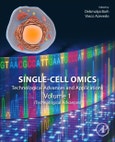Single-cell Omics, Volume 2: Advances in Applications provides the latest single-cell omics applications in the field of biomedicine. The advent of omics technologies have enabled us to identify the differences between cell types and subpopulations at the level of the genome, proteome, transcriptome, epigenome, and in several other fields of omics. The book is divided into two sections: the first is dedicated to biomedical applications, such as cell diagnostics, non-invasive prenatal testing (NIPT), circulating tumor cells, breast cancer, gliomas, nervous systems and autoimmune disorders, and more. The second focuses on cell omics in plants, discussing micro algal and single cell omics, and more.
This book is a valuable source for bioinformaticians, molecular diagnostic researchers, clinicians and several members of biomedical field interested in understanding more about single-cell omics and its potential for research and diagnosis.
Please Note: This is an On Demand product, delivery may take up to 11 working days after payment has been received.
Table of Contents
Section I Single-Cell Omics: Biomedical Applications1. Single-Cell Diagnostics, Prognosis, and Therapy2. Single-Cell Omics in Noninvasive Prenatal Testing (NIPT)3. Single-Cell Omics: Circulating Tumor Cells4. Single-Cell Technology for Human Gliomas5. Application of Single-Cell Omics in Breast Cancer6. Single-Cell Omics: Strategies Towards Theranostic Biomarker Discovery Along the Continuum of Premalignant to Invasive Disease in Oncology7. Single-Cell Omics in CVDs8. Single-Cell Omics in Metabolic Disorders9. Single-Cell Omics in Autoimmune Disorders10. Single-Cell Omics in Human Reproductive Medicine-Our Clinical Experiences in Single-Cell Therapy11. Single-Cell Omics for Drug Discovery and Development12. Single-Cell Omics in Personalized Medicine13. Cell-Based Medicine and Therapy
Section II Single-Cell Omics in Plants14. Single-Cell Omics Approaches in Plants15. Bulk to Individuality: Specifying Plants' Cellular Functions Through Single-Cell Omics16. Single-Cell-Type Metabolomics for Crop Improvement17. Single-Cell Omics in Crop Plants: Opportunities and Challenges
Authors
Debmalya Barh Federal University of Minas GeraisBelo Horizonte
Brazil. Dr. Debmalya Barh is the Founder and Principal Scientist of Institute of Integrative Omics and Applied Biotechnology (IIOAB), INDIA. He is having 15+ years leading academic, healthcare, molecular diagnostic, and bioinformatics industry experience and an expert in integrative omics-based biomarkers, targets and targeted drug discovery, and personalized medicine in cancers and various complex diseases. He works with more than 400 scientists from 100+ top ranked organizations across 40+ countries and has 220+ publications and a branded editor for 10+ cutting-edge omics related reference books. He is a reviewer of journals from Nature publications, Elsevier and AACR Journals, CMAJ, NAR, Molecular Medicine, Gene Therapy, BMC Series, Bioinformatics, PLOS etc. Due to his significant contribution in the field; he has been recognized by Who's Who in the World and Limca Book of Records. Vasco Ariston De Car Azevedo Professor, Institute of Biological Sciences, Federal University of Minas Gerais (UFMG), Brazil. Dr. Vasco Azevedo is a full professor at the Department of Genetics, Ecology, and Evolution, Institute of Biological Sciences, Federal University of Minas Gerais, Brazil. He is a CNPq (Conselho Nacional de Desenvolvimento Cient�fico e Tecnol�gico) researcher 1A, member of the Brazilian Academy of Sciences, Commander of the Order of Scientific Merit of the MCTI of the genetics advisory committee and the public policy working group on biotechnology and genetic resources of COBRG/CNPq, coordinator of the Associated International Laboratory Bactinfl from INRAE and UFMG, and vice-president of the Brazilian Association of Bioinformatics and Computational Biology. He holds a degree in veterinary medicine from the School of Veterinary Medicine of the Federal University of Bahia (1986), a master's degree (1989), a doctorate (1993) in the genetics of microorganisms from the Institut National Agronomique Paris Grignon, and a doctorate in bioinformatics from UFMG (2017). He did his postdoctorate work with the Department of Microbiology, School of Medicine, University of Pennsylvania, United States (1994). He was a professor at the Institute of Biomedical Sciences of the University of S�o Paulo (2004). He is an expert in genetics and bioinformatics and his work mainly focuses on genomics, transcriptomics, proteomics, metabolomics, vaccine development, diagnostics, and the development of next generation probiotics. He has more than 600 scientific publications, 14 books, and 60 chapters as well as 12 patents.








